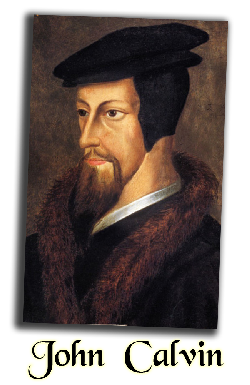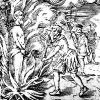John Calvin’s Reign of Terror
showed by his actions that he had no disagreement with the basic principles behind the Spanish Inquisition
John Calvin, the spiritual father of the Presbyterian and Reformed churches, dominated the town of Geneva, Switzerland. From 1541 to 1546 the civil government enforced severe penalties against those who disagreed with his reforms. Although a Protestant, He showed by his actions that he had no disagreement with the basic principles behind the Spanish Inquisition — that the church was charged by God to enforce uniform belief and proper Christian behavior among the entire populace. As one biographer put it, “It was not in his nature to be evasive with heretics…” [From the Foreword to “Calvin’s Institutes, A New Compend,” page 10, Hugh T. Kerr, editor (1989)]. In a five-year period, fifty-eight people were executed and seventy-six were banished because of Calvin’s straightforward nature.
The most famous execution occurred in 1553 — Michael Servetus, a Unitarian. In that year he was passing through Geneva, fleeing the death sentence of the Catholic Church for his heretical views. Yet because of his lively interest in religious matters, he went to listen to Calvin, now one of the most famous leaders of the Reformation. Unfortunately for Servetus, he had sent some of his papers to Calvin seven years earlier, questioning many established doctrines, including that of the Trinity (the three Persons of God). Calvin had responded roughly to Servetus, refusing even to return the papers. Calvin had even then condemned him, showing his full agreement with the judgment of the Catholic Church. He had written to a friend that if Servetus ever came to Geneva, “I will never let him depart alive, if I have any authority.” [William R. Estep, “Renaissance and Reformation”; pages 221-248 deal with Calvin’s contribution to the Protestant Reformation.]
Calvin favored cutting Servetus’ head off. The town went even further than this and burned the man alive…
On that fateful day in 1553, Calvin recognized and denounced Servetus, who was promptly arrested and condemned as a heretic (one who disagrees with accepted beliefs). The laws of Geneva regarding heretics had changed several years earlier, and exile was the strictest penalty that remained. Nevertheless, Calvin favored cutting Servetus’ head off. The town went even further than this and burned the man alive… History records that he shrieked with agony when the flames reached his face, and burned for another half hour before dying [“The Renaissance,” by Will Durant, pages 482-484]. Such facts trouble sincere people. Do they trouble you? And a very troubling question is, why do the people with “good doctrine” murder the people with “bad doctrine”, and not the other way around?
The fact that the victims, like Servetus, often held heretical opinions tends to confuse the real issue for many Christians, namely: isn’t such killing the bad fruit of a bad tree? While no one in America today would want Unitarians executed, assuredly Calvin would, and so would Luther, and most certainly Augustine and many other Catholic theologians. The history of their churches leaves absolutely no doubt about this.
Calvin executed Servetus under the ancient law of the Empire known as Justinian’s Institutes, which, since 533 AD, had made two beliefs capital crimes: denial of infant baptism and denial of the Trinity. As the Encyclopedia Brittanica states, the Emperor Justinian’s concern for religious matters stemmed from “the extent to which church and state were indissolubly linked as essential aspects of a single Christian empire, the terrestial [earthly] counterpart of the heavenly polity (political organization).” [Vol. 10, page 364 (1979)]
This was the exact understanding of church and state that Calvin possessed, and it is not hard to find in the books of many who proclaim America a Christian nation. It is sobering to consider that at least five American Presidents (Unitarians or Deists) would have been executed under this code of law, and many, many other Americans as well. Every attempt of men to bring heaven to earth through law — and not through grace — has ended up freely shedding blood to do so.
So the question must be asked of all sincere believers: was Calvin correct in his view that heretics should be executed? And what does it say about him if he was wrong? A letter he wrote the King of England concerning the spread of the Anabaptists to England presents an even more difficult issue — the persecution of people who believed in all the orthodox Christian creeds. The problem with the Anabaptists was that, according to their conscience, they could not go along with Christians bearing arms, serving in government, or baptizing infants who could make no confession of faith. Calvin wrote King Henry the Eighth, “It is better to burn a few (Anabaptists) at the stake, than for thousands to burn in hell.”
If it was right to execute heretics back then, then why is it not right now, also? This is what many people fear whenever talk of a Christian nation comes up. On the other hand, if it would be wrong now, was it not wrong then? So, what then is the condition of the tree from which today’s mainstream Christianity has branched forth? This is no light issue. The answers to these questions can help determine which of the two women spoken of in the Book of Revelation each of us is a part of: the Bride of Messiah (Revelation 19:7-8) or the Harlot drunk with the blood of the saints (Revelation 17:6). Which woman were Calvin and theologians like him a part of? Calvin’s words on his deathbed shed light on this question, for as he faced death his cold doctrines could no longer silence his conscience. All he could say was, “I am a wretched sinner” [“A New Compend,” page 9].
Can Calvin’s actions in the case of Servetus be called anything less than pre-meditated murder? Did such deliberate violations of conscience on Calvin’s part cause him to become totally depraved, or was he always that way from birth, as his doctrines proclaimed? Is it not by their deeds that you shall know the false prophets? (Matthew 7:15-20). Is God a Calvinist, or is He the righteous Judge who will repay the wicked for their wicked deeds as Revelation 19:2 proclaims?
Too late, too late, Calvin awakened on his deathbed out of the drunken stupor he had lived in for so long (Revelation 17:6). Too late to bring any of his slain back to life, too late to undo the demoralizing effects his doctrines would have on millions. Too late to alter the evidence that proved he never knew God, or His Son — as the Savior’s own words make clear: “…an hour is coming for everyone who kills you to think that he is offering service to God. And these things they will do, because they have not known the Father, or Me” (John 16:2,3).
All men are sinners, but not all are murderers, not all are oppressors, not all have ruined other people’s lives as these men did. All sin is not the same, and not all sin makes a man worthy of the Lake of Fire (Romans 2:12-16).
Many have made excuse for the violence of the Reformers, saying their deeds just reflect the times they lived in. Others have acknowledged it, but have swept the horror of it under the thought, all men are sinners, aren’t they? All men are sinners, but not all are murderers, not all are oppressors, not all have ruined other people’s lives as these men did. All sin is not the same, and not all sin makes a man worthy of the Lake of Fire (Romans 2:12-16). Even in the days of the Reformers some men were crying out for the freedom of the human conscience, often at the risk of their own lives.
The denial of human freedom in the history of Christianity is a scarlet stain stretching across centuries of agony and oppression. It is known sin for which there is no atonement, the complete denial of the words and example of the Messiah, who never once forced others to believe in His costly message. Indeed, the history and doctrines of Christianity are the greatest justification for not believing in her savior, as the third President of America saw so clearly:
“I can never join Calvin in addressing his God. He was indeed an athiest, which I can never be; or rather his religion was demonism. If ever man worshipped a false God he did. The Being described in his five points is not the God whom you and I acknowledge and adore, the Creator and benevolent Governor of the world, but a demon of malignant spirit. It would be more pardonable to believe in no God at all than to blaspheme Him by the atrocious attributes of Calvin” [Letter to John Adams, written in Jefferson’s eightieth year, quoted in “The Jefferson Bible,” page 378].
Quotations
“The Protestant authorities, following Catholic precedents, accepted the obligation to maintain religious conformity… soldiers [were sent] to take possession of all churches and monasteries; altars and statues were removed, and priests, monks, and nuns were banished… Censorship of the press, already established in Catholic areas, was adopted by the Protestants… at the request of Luther and Melanchthon the publication, sale, or reading of Zwinglian or Anabaptist literature, or the preaching or teaching of their doctrines, was prohibited.” [The edict also said that anyone who knew of such teaching, preaching or reading, even by close relatives, and who…] “do not give information, shall be punished by loss of life or property.”
This was no different than the laws passed by the infamous Spanish Inquisition, the supreme example of the oppression of the human mind and soul.
[From “The Reformation,” by Will Durant, page 424.]
Although Protestantism emphasized the right of private judgment and the sufficiency of individual faith for salvation, neither Martin Luther nor John Calvin intended to sponsor a system that condoned liberty of conscience. For each man there was only one truth, a single Church of God, and imperative need for perfection after a millennium of Catholic error. “Heretics are not to be disputed with, but condemned unheard,” Luther cried out, “and while they perish by fire, the faithful ought to persue the evil to its source, and bathe their hands in the blood of the Catholic bishops, and of the Pope, who is a devil in disguise.”
[from Roger Williams, John Cotton, and Religious Freedom, by I. R. Polishook.]

“Father” of the Presbyterian and Reformed churches…
In a five-year period, fifty-eight people were executed and seventy-six were banished because of Calvin’s straightforward nature.
Calvin executed Servetus under the ancient law of the Empire known as Justinian’s Institutes, which, since 533 AD, had made two beliefs capital crimes: denial of infant baptism and denial of the Trinity.
Calvin wrote King Henry the Eighth, “It is better to burn a few (Anabaptists) at the stake, than for thousands to burn in hell.”
Thomas Jefferson wrote John Adams, “I can never join Calvin in addressing his God. He was indeed an athiest, which I can never be; or rather his religion was demonism. If ever man worshipped a false God he did. The Being described in his five points is not the God whom you and I acknowledge and adore, the Creator and benevolent Governor of the world, but a demon of malignant spirit. It would be more pardonable to believe in no God at all than to blaspheme Him by the atrocious attributes of Calvin”




